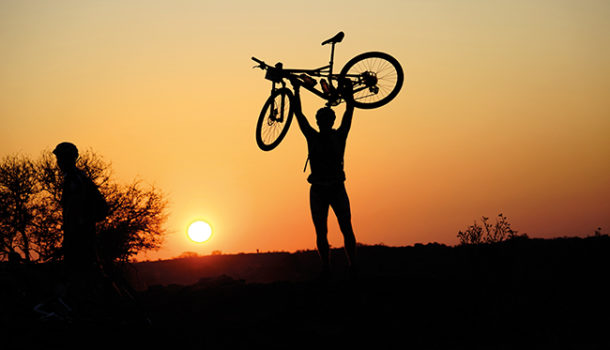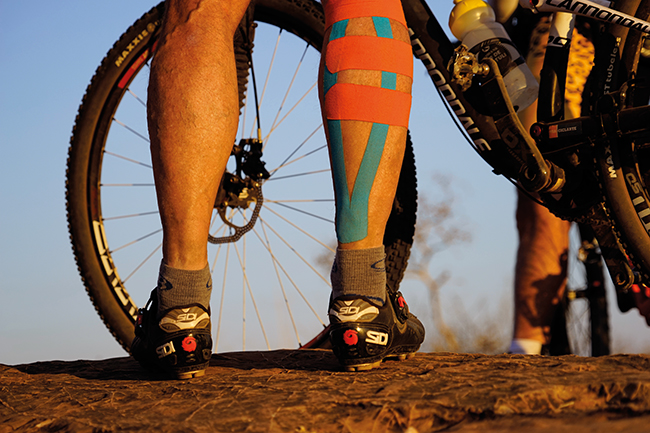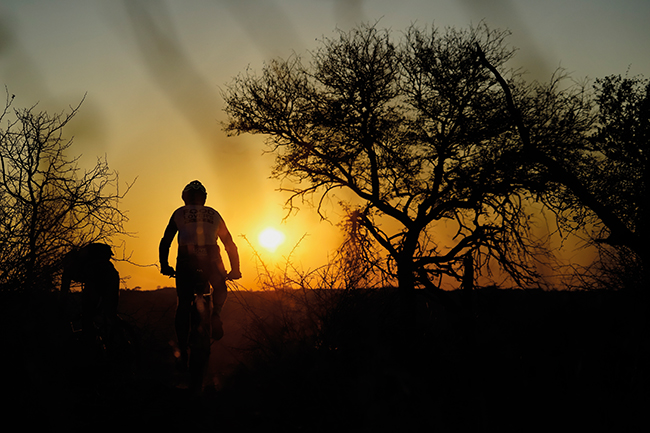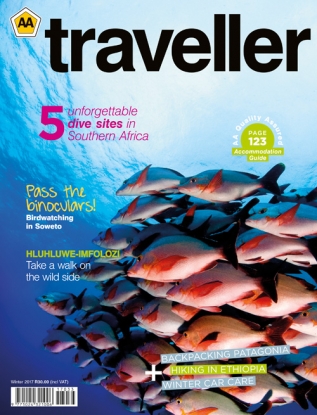Arid savannah dotted with ancient baobabs unfolding across three countries. Rugged outcrops stacked against a swathe of duck-egg-blue sky. And endless miles of elephant single-track, linking it all together. Jacques Marais gets to grips with the mountain-bike trails of the Tuli Block
So, there’s Trent and me, sitting under a witgatboom. In Latin, it goes by Boscia albitrunca, but I quite like the Afrikaans ‘white-arse tree’. The reason we’re in the only decent shade amid the sandstone koppies of Mashatu, Botswana, is because we’re waiting for riders taking part in the multi-day Tour de Tuli (TdT) mountain bike event. Also, it is 43.8°C, which translates to ‘bloody hot’ in any language.
The annual Nedbank Tour de Tuli pits around 340 participants against 280 km of grungy trails, ridden over four searing days. Most of the route follows a network of ever-changing and fast-flowing elephant single-track, criss-crossing Botswana, Zimbabwe and South Africa’s far-flung Limpopo Province.Today, it seems as if the guys and girls are suffering, which is no surprise with heat exhaustion and dehydration taking their toll. Sandy ditches, haak-en-steek thorns and rocky ridges snap at your calves, and the potential for ending up face-to-face with big cats – or bigger elephants – at any given moment…
Gigantic pachyderm footprints litter our immediate surrounds, and only a couple of hours ago, we spotted a male leopard’s spoor under a Mashatu tree. Trent is my guide for TdT, and our mandate is to mountain bike at speed between the various groups to grab photos of what surely rates as one of Africa’s wildest rides.
Our sole measure of protection is a puny thunder-flash, slightly larger than a Bic pen, so any cracking twigs have me whipping my head about like a dog at a stick-throwing exhibition. It is exactly this wildness that is the main drawcard at this event, because a true wilderness experience is what participants from around the globe crave.
Cellphone reception is restricted to the occasional rocky koppie; your home for the night is a tiny tent, usually in a dry riverbed; and your 4 am wake-up call ensures you set off on a gnarly bike trek of up to 10 hours in the saddle. At night, jackal, hyena and African wood owl are sure to serenade you while you drift off to sleep.
Chances are, everything around will be covered in dust, but to this gathering of fat trackers from around the globe, this is the epitome of paradise. I concur, because you get addicted to nuzzling so close to Mama Africa, and soon discover how little you need to get by.
That said, Tour de Tuli still boasts an unmatched degree of luxury compared to similar events. Hot showers every night, a great cappuccino or two as the sun shows its face, five-star food and, of course, masseuses on hand to ensure your body remains in working order.
The fact that it is not a race is a bonus. It gives you a chance to stop and gawp at giraffes and ellies, or to study tracks in the sand while gulping lungfuls of fresh African air. A close sense of camaraderie forms between the individual groups – each with trusted guides – and by day five, you are sure to feel like family.
It truly is an unbelievable mountain biking adventure, but you need to be pretty quick to sign up every year if you want to secure a spot. But here’s the good news: these days, you can experience the Tuli trails outside of the actual event, and you don’t even have to be a tough-as-nails rider either.
A number of leading adventure operators now offer anything from half-day outings to multi-day guided rides to experience the area. Joining them allows you to roam free in a land of limitless views, endless skies, jaggy trails and snarly wildlife. It is highly likely you will bump into animals in either Mashatu Game Reserve, or the adjacent Tuli Game Reserve. Both these Botswana destinations offer quickie or overnight outrides, and you can pretty much expect the same kind of terrain as the Tour de Tuli itself.
The former of these two premium reserves is also known as ‘the land of giants’, a reference to the vast herds of elephants that inhabit the region.
Mashatu is the epitome of all that defines wilderness in Africa, boasting an unparalleled diversity of wildlife – what better way to experience this soul of Africa than on a mountain bike?
Towering nyala-berry trees, extensive plains covered in dense stands of mopane bush, sandy river beds, arid savannah plains and dramatic sandstone outcrops lording over the semi-desert surrounds … this all comes standard as part of the view you will have over your handle bars if you join the crew from Cycle Mashatu on one of their tailor-made MTB tours.
Your second MTB adventure option comes courtesy of Cycle Tuli in Tuli Game Reserve – following jeep track, single track and elephant footpaths. Here on the open plains, you’ll be surrounded by herds of animals, roaming free within a natural habitat ranging from sandstone koppies and leadwood forests to mopane bush and riverine woodland.
Follow your front wheel along the banks of the mighty Shashe and Limpopo rivers or stop for a break in the shade of baobabs, all the while exploring novel trails along an endless network of game footpaths. The riding at both destinations makes for an unforgettable experience on the bike, with knowledgeable guides sharing both their bush wisdom and insight into local culture.
All you need to do now is saddle up and start pedalling for the adventure of a lifetime.
GOOD TO KNOW
Tuli Cycling
The basics
Expect it to be hot. Very hot. If you believe the locals, temperatures can peak in the high 50s. Avoid midsummer, and be sure to exit your sleeping bag at the crack of dawn to start riding by sunrise. Take lots of water and apply high-SPF sunscreen, and you’ll be good to go. This is not solo-riding territory, so book well in advance with one of the existing MTB adventure operators in the area.
At the top of the list are Cycle Mashatu (www.mtbsafaris.com) and new kids on the block Cycle Tuli (www.tuligamereserve.com). Both offer a world-class experience, so get ready to ride!
Getting there
Follow the N1 north towards Polokwane, and then turn on to the R521 towards Sheshego (Louis Trichardt) before following the sign towards Mogwadi/Vivo/Alldays. You will reach Alldays after 145 km. At the T-junction, turn right to the Pontdrift border post (59 km). You will meet your guides here, and your vehicle can stay safely in the car park.
Pontdrift: S22 12 0.0 E29 8 0.0
Things to do
Non-riders at both destinations have a range of activities to keep them busy, with everything from game drives, walking safaris and horse riding, to just taking some time out chilling in nature or at one of the well-appointed lodges.
If you want to experience the camaraderie and exhilaration of the Nedbank Tour de Tuli, visit www.tourdetuli.com for more info. Best of all is that you are doing this for a good cause, because every cent collected is donated directly to the Children in the Wilderness fund. Each rider contributes a minimum of R23 500, and these funds are used to raise local children and instil in them a love of nature.
Where to stay
There is a variety of accommodation types to suit all tastes and budgets, including:
www.mashatu.com, www.tuligamereserve.com
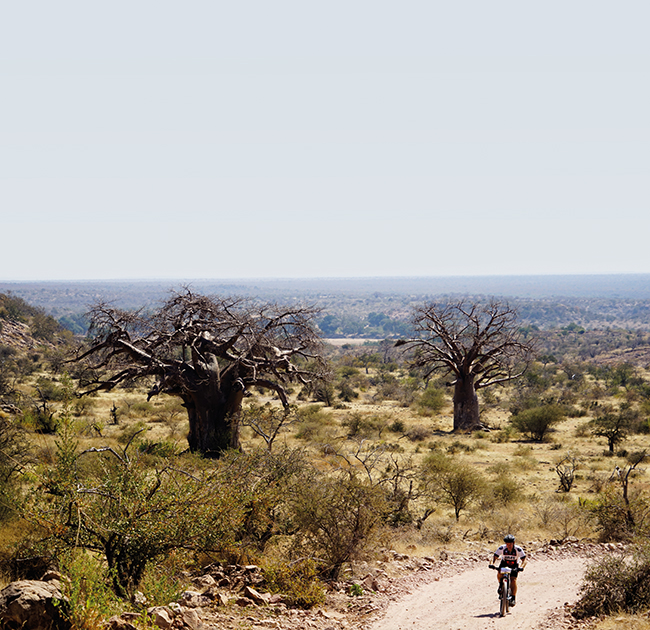
Photography Jacques Marais, mashatu.com
(This article was first published in the summer 2015/16 issue of AA traveller magazine)

